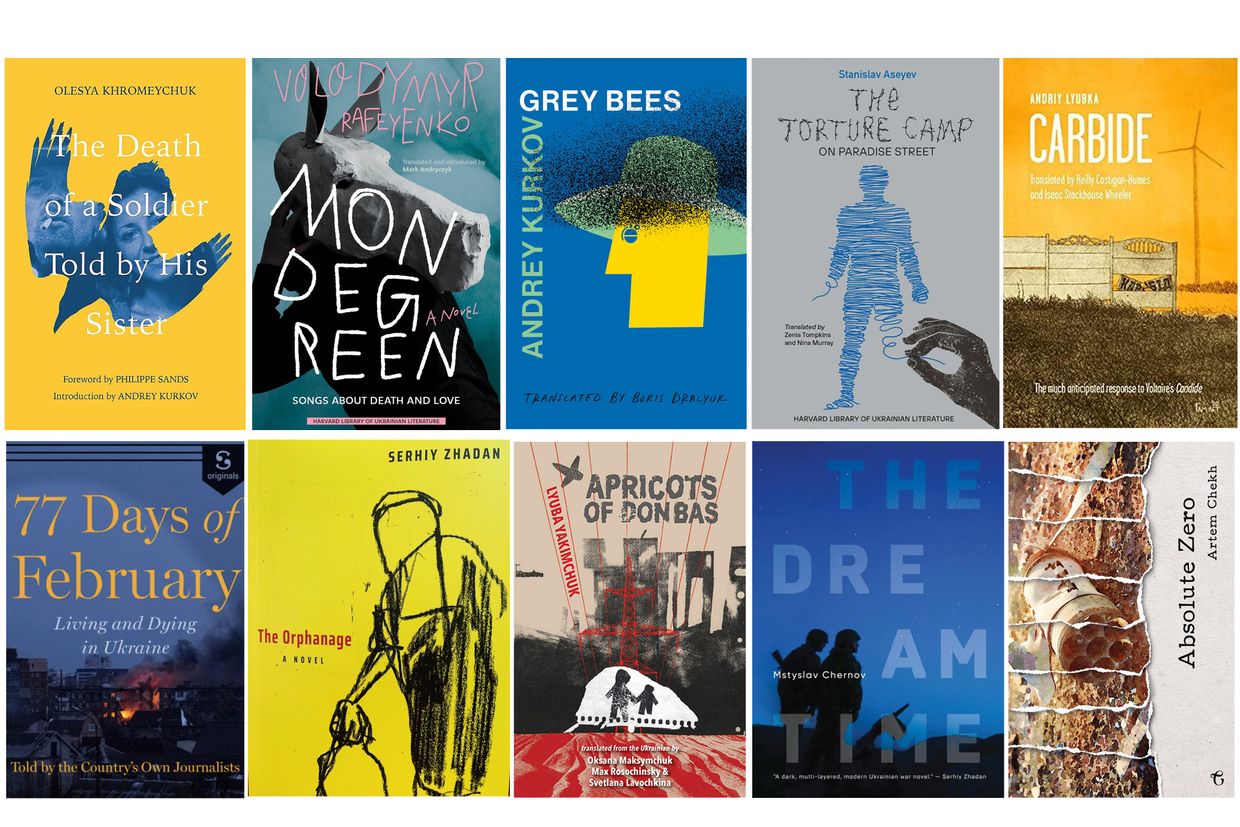In 2014, one Ukrainian writer kept a diary during Russia’s occupation of Donetsk

The propaganda surrounding Russia’s 2014 invasion of Donetsk and Luhansk oblasts has been so pervasive that, even a decade later, people continue to parrot lines about the need to "protect the Donbas people from the Kyiv regime."
It’s time for the voices of people from both regions to be heard and their words to be widely disseminated in English. Many already do, albeit through more literary forms such as Lyuba Yakimchuk’s poetry collection “The Apricots of Donbas” and Volodymyr Rafyenko’s novel “Mondegreen.”
Thanks to Harvard’s Ukrainian Research Institute, another important book relating to the start of Russia’s war is now available for English-language readers in Annie Fisher’s translation. Olena Stiazhkina’s “Ukraine, War, Love,” a diary documenting the start of the events in 2014, can perhaps be best summarized by the line: “What’s it like when Russians come to ‘save Russian speakers,’ and then kill them?”
In the weeks following the EuroMaidan Revolution, which led to the ousting of pro-Kremlin President Viktor Yanukovych, Russia illegally annexed Ukraine’s Crimean Peninsula and launched an invasion of the eastern Donetsk and Luhansk oblasts. As Stiazhkina notes, these events didn’t unfold overnight and it was difficult for some on the ground in Donetsk and those observing from afar to understand the gravity of it all. Additionally, the disruptive events leading up to the occupation occurred over a long enough period of time for Russian television to distort them and present them as an authentic local “boycott” of the revolution in Kyiv.
“The catastrophe of occupation unfolded gradually, hour by hour, day by day. That’s probably why, at first, we couldn’t believe it; then we couldn’t stop it. For the entire world, this part of the Russians’ war against Ukraine was invisible, hidden behind the smoke screen of a crudely cobbled-together ‘suffering people of Donbas’,” Stiazhkina writes.
“We — I — have reasons for self-reproach,” she adds. “Being unaware doesn’t mean you don’t care; it means you’ve been stupid."
While some of “(Donetsk’s) own idiots” were involved, Stiazhkina describes how the “overwhelming majority of the people who wiped Donetsk off the face of the earth” were actually from Russia.
One clear indicator of who was who back then was the language difference. This might seem somewhat unusual to outside observers given Russian is widely spoken in Ukraine, but Ukrainians from the eastern regions who speak Russian have noticeably different accents and word choice compared to those from Russia.
In one scene, Stiazhkina recalls a man in camouflage saying: “Hey, you. I’m talking to you. Get back behind the ‘porebrik’.” The word “porebrik” means curb in Russian, but it is not used by Russian-speaking Ukrainians in Donetsk — they use the word “bordyur.” According to Stiazhkina, “(People from St. Petersburg) think the ‘bordyur’ is one of those architectural excesses on walls.” Noting the language difference from these armed people in military gear “causes bewilderment. Puts us in a stupor, even…”
Many of the armed “rebels” had no clear understanding of the geographic layout of Donetsk, either. When they marched on March 9, 2014, to take Donetsk Oblast’s State Administration building by force, “they were off by a whole block,” Stiazhkina writes. “Could you imagine people (in Paris) marching out to take the Bastille but ending up on the Place de la Concorde (which is nearly five kilometers off) instead?”
Stiazhkina is adept at unraveling the complicated questions of identity that one is forced to confront in the middle of an existential war. In the introduction, which was written after the beginning of Russia’s full-scale war against Ukraine on Feb. 24, 2022, she acknowledges that she used to be one of those people who believed that it was “Putin, not Pushkin” who was guilty of what was happening.
Like some of her peers, Stiazhkina also wrote in Russian, which brought her recognition in both Ukraine and Russia. In 2014, her work was shortlisted for the Russian Prize, a prestigious award given in Moscow for the best texts written in Russian by foreigners. She later notes that such awards were one of the ways for Russia to maintain its soft power over other countries, even after they gained independence from the Soviet Union, as it helped to “legitimize” the so-called Russian world abroad.
While many Ukrainians like Stiazhkina, who once predominantly spoke Russian, grapple with changes in their worldview, their acquaintances in Russia are being drawn further into the past. This deceptive nostalgia is most evident today in the distortion of World War II history, with Russian leader Vladimir Putin framing his war against Ukraine as another “fight against Nazism.”
“Russia does not exist. Russia was tempted back into the past, where it dissolved,” Stiazhkina explains.
She goes on to recall an incident when someone from Russia called her during the fall of Donetsk to wish her a happy International Women’s Day on March 8. While the holiday is used abroad to highlight women’s rights and gender equality, in former Soviet republics, including Ukraine and Russia, it has often been used to do the opposite – reinforcing the patriarchal idea that women are inherently delicate and fragile. The holiday is still celebrated in Ukraine today, but many women have called for its cancellation.

The typical March 8 greetings about love, health, and family feel meaningless during awar. Stiazhkina shouts into the phone, “This is my country. What are you doing to us?” Meanwhile, the Russian caller on the other end replies that their homeland — meaning both Ukraine and Russia — was the Soviet Union. When Stiazhkina calls them the enemy, they respond indignantly, asking why she is acting “like that.”
“Back then, I still thought you should talk to Russians because it wasn’t meaningless,” she confesses. “My concept of Russian civil society was false from the get-go.”
“As for Pushkin... No. I don’t want him to save me,” Stiazhkina continues. “Not him, and not any other kind of ‘great Russian culture’ — may it rot, seeing how it has created, and continues to create, monsters who rape children and steal washing machines.”
Several analogies in the book effectively highlight the severity of the Russian occupation of Donetsk for foreign readers. For instance, while speaking to the person from Russia who called her on March 8, Stiazhkina asks them to imagine themselves as someone enduring the first winter of the Leningrad Blockade during World War II and receiving a well-wishing call from someone in Berlin.
Stiazhkina also draws parallels between Russian aggression against Donetsk with the sexual assault of a woman: “They beat her with checkpoints and sandbags. Every day they tore off her dress, which had once been yellow and blue. Like any other rape victim, she thought she was to blame.”
“If my Donetsk had been a man, we would’ve easily made it through any amount of mockery. We’d have had the strength,” she continues. “But here she is, a woman. And I’m not sure if a century of love will be enough for her to stop remembering, and feeling shame, and trembling at the slightest touch.”
While "Ukraine, War, Love" offers a somber account of the onset of Russia's war against Ukraine, the "love" in the title should not be overlooked. Throughout the book, Stiazhkina reflects on finding strength in the Ukrainian language and culture “which makes you free” and “becomes the language of safety and life” for those living through “a slow descent into hell.”
This love also encompasses a considerable amount of dark humor, a hallmark of Stiazhkina's work and arguably a significant aspect of the Ukrainian mentality that allows so many to process the horrors of war on a daily basis.
In one passage, Stiazhkina notes a friend's remark: having lost his mother, wife, and one of his children to the war, he expresses a desire to visit Moscow "once it looks like Mariupol," one of the Ukrainian cities largely destroyed and then occupied by Russia at the start of the full-scale invasion in 2022.
“I almost agree with him, it’s just that I’m not willing to actually go there,” Stiazhkina writes. “A few good pictures will be enough for me.”
Note from the author:
Hi, this is Kate Tsurkan, thanks for reading this article. There is an ever-increasing amount of books about Ukraine available to English-language readers, and I hope my recommendations prove useful when it comes to your next trip to the bookstore. Ukrainian culture has taken on an even more important meaning during wartime, so if you like reading about this sort of thing, please consider supporting The Kyiv Independent.













